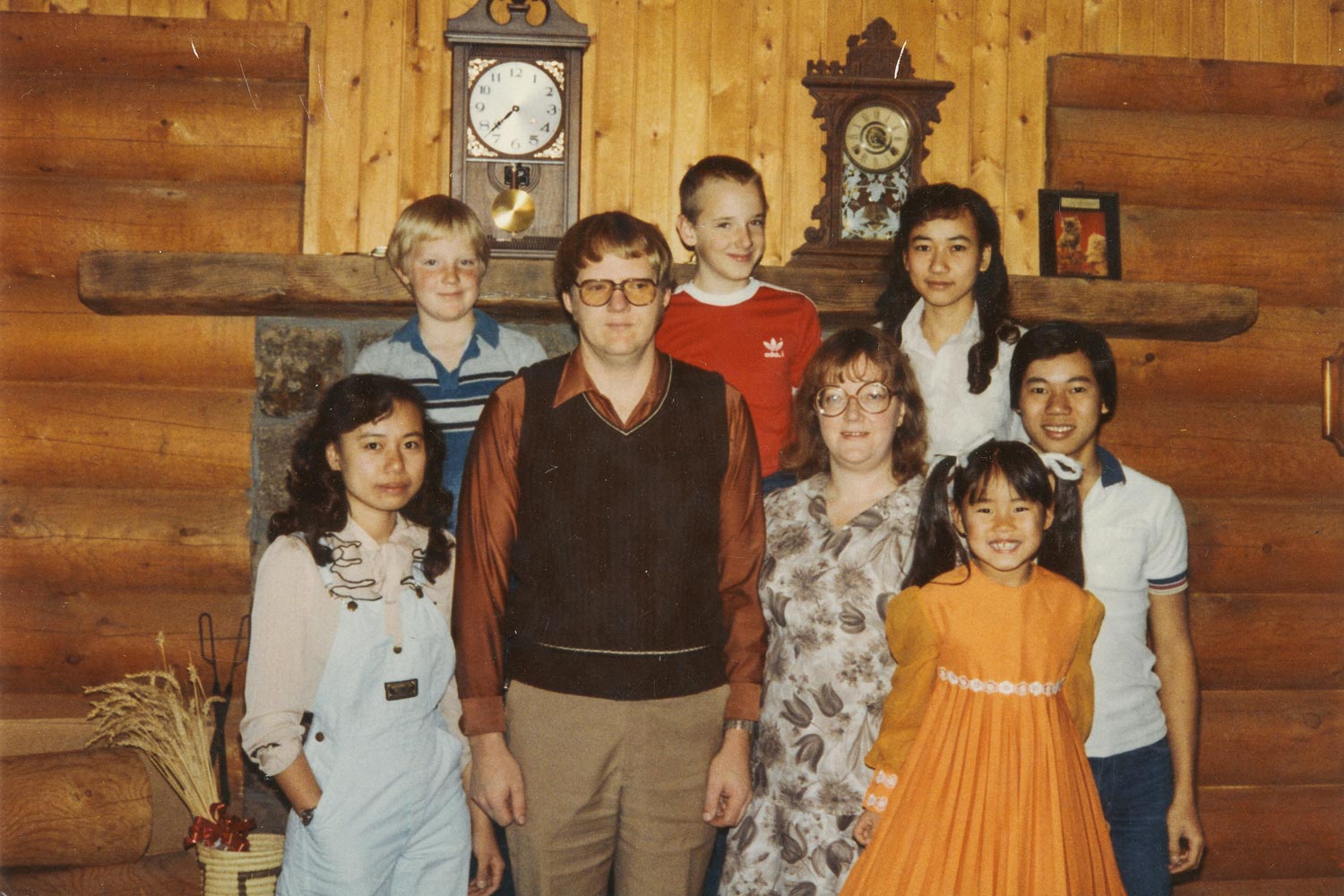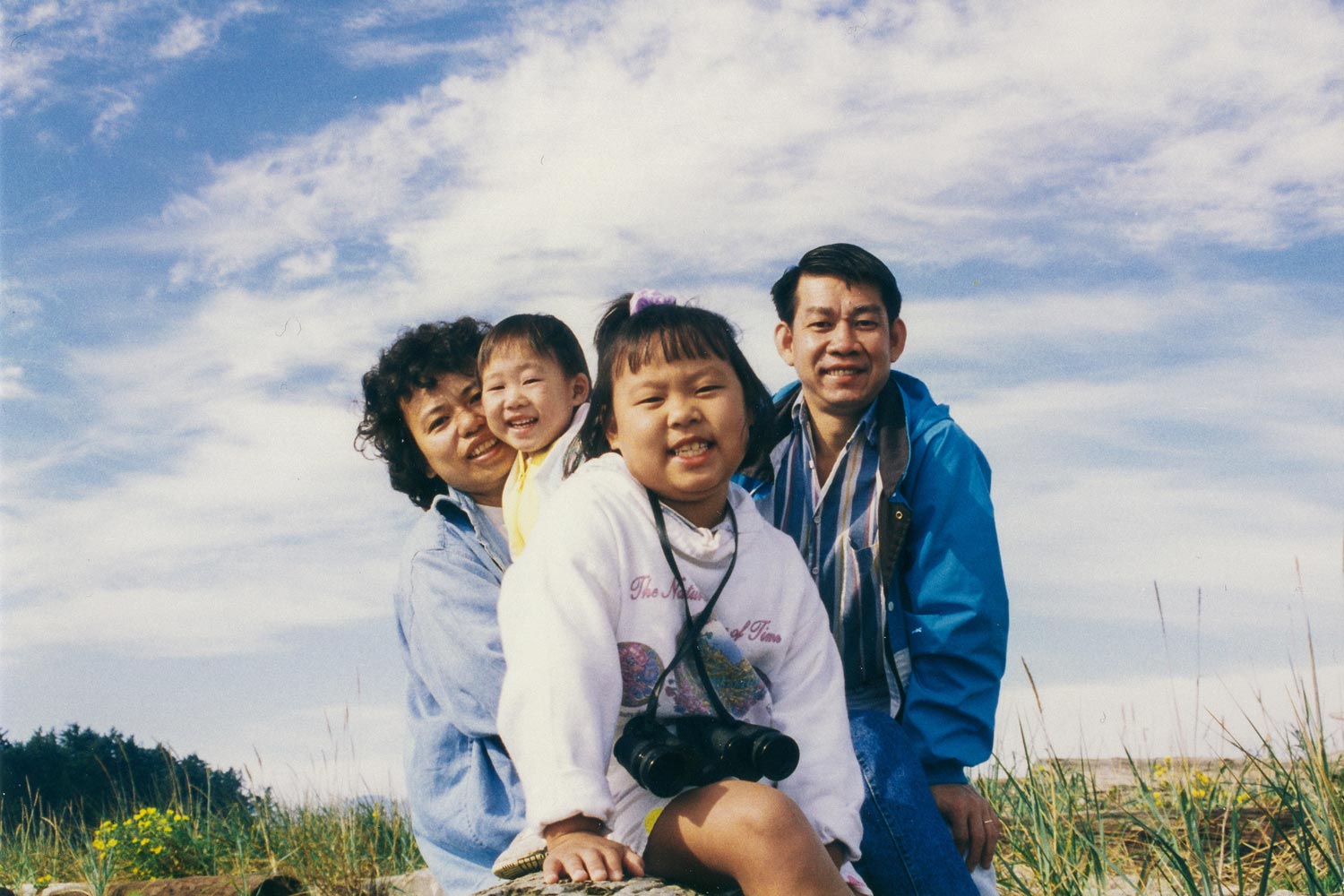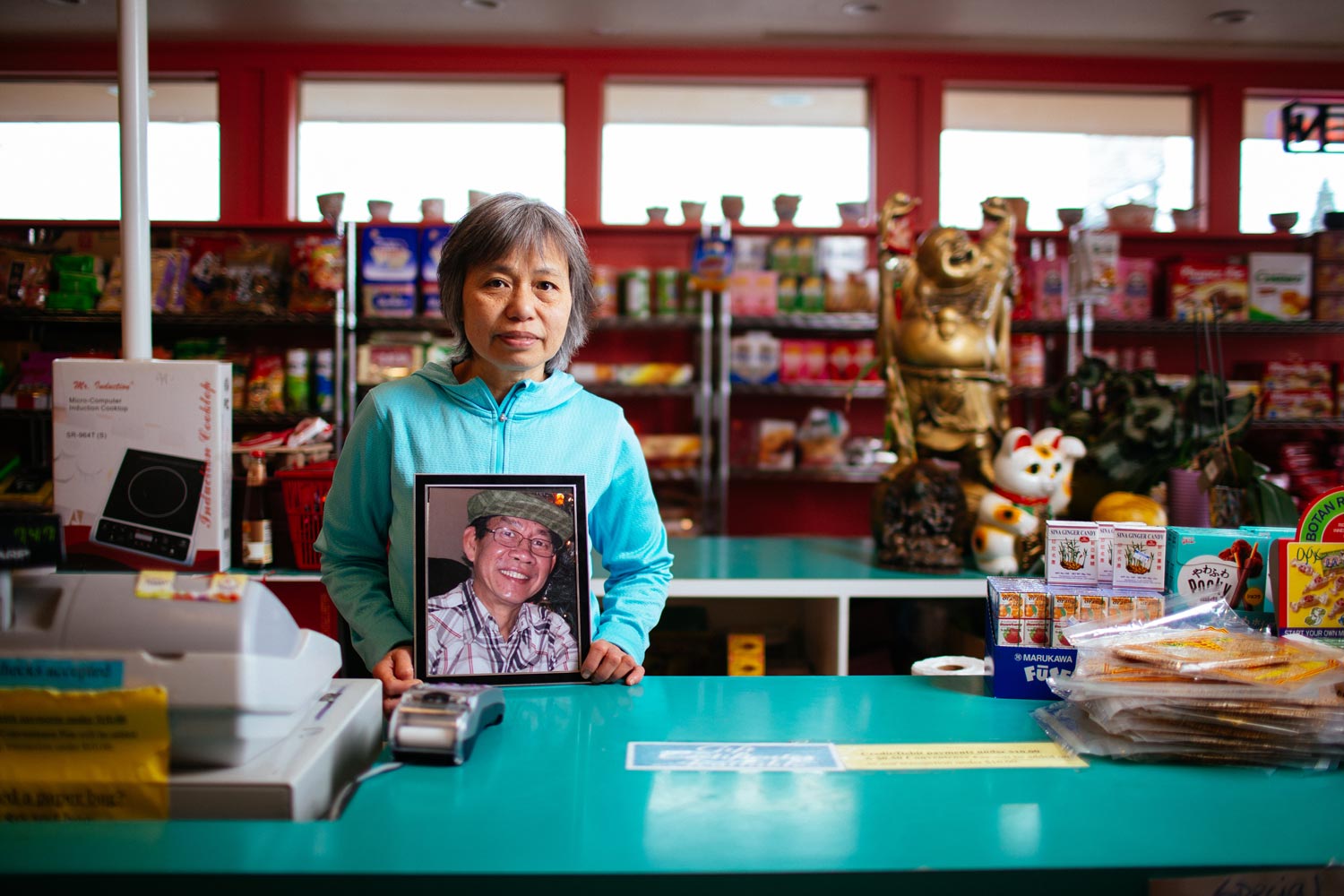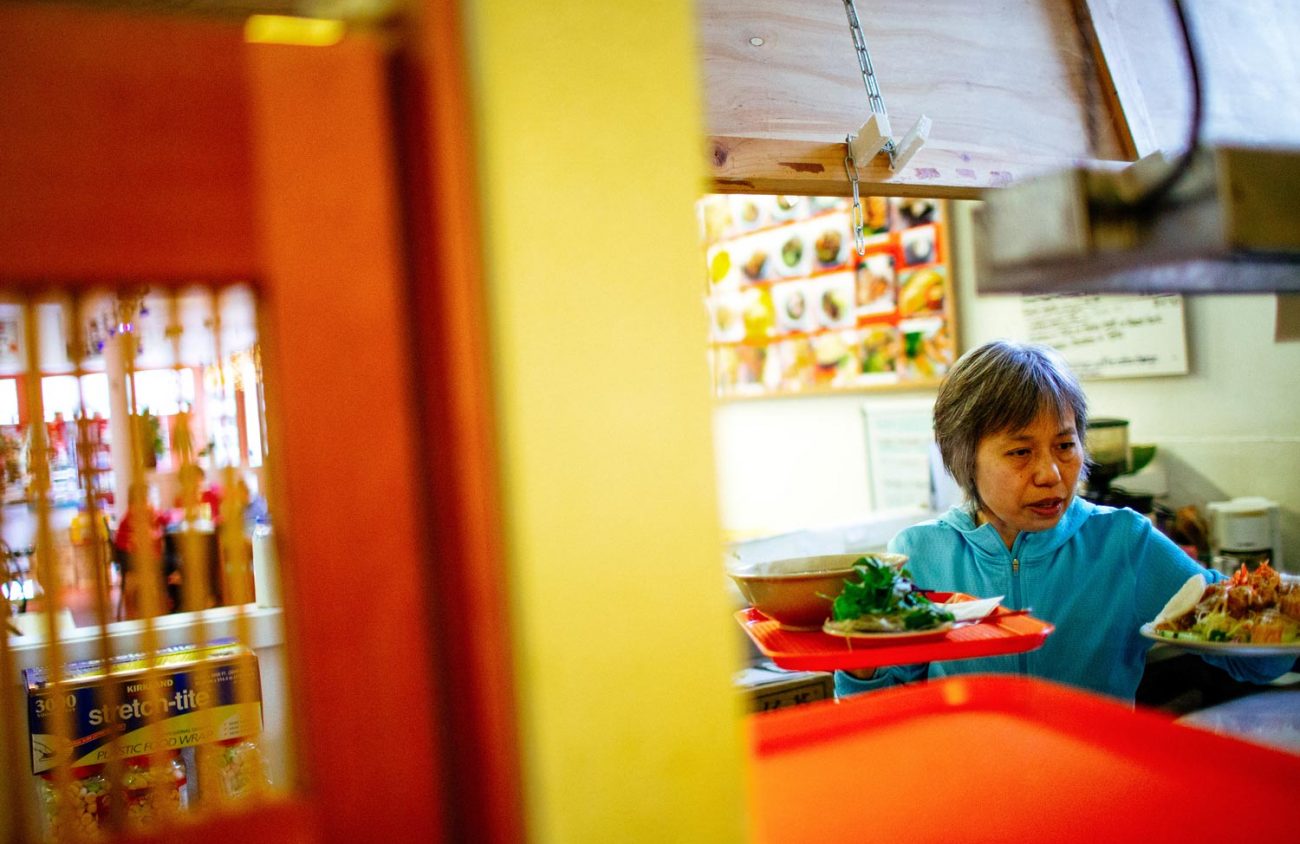It’s morning at Y’i Shen Market and the restaurant’s kitchen is waking up.
Chicken and beef broths — made daily — bubble in vast pots on the back of the stove, wafting the aroma of star anise, garlic and onions. A peek inside a standing roaster reveals glistening duck, barbeque pork butts, shoulder and belly, destined for the day’s rice dishes.
A 15-inch wok and its 25-inch cousin stand at attention. And, along the prep line, chopped lime, green onions, bean sprouts and jalapeños burst with color, ready to add comfort and complexity to every steaming bowl of Y’i Shen’s Vietnamese noodle soup, phở.
Owner Phung Tu and I are sitting at a table in the restaurant section of the cheery shop. Nearby shelves are lined with Vietnamese staples: chili sauce, curry paste, rice vinegar, coconut milk and dried noodles.
“I was born in 1960 in Đà Lạt, a small city in Vietnam,” Tu says.
Known as the “City of Eternal Spring” for its distinctive temperate climate and its hills, pine forests, lakes and waterfalls, Đà Lạt was developed as a resort by the French in the early 1900s, and many reminders of its colonial heritage remain.
“But when I was a child, my parents owned a hardware store in another small city, Buôn Ma Thuột,” Tu says.
Though war raged in the country surrounding them, Tu’s parents — Nam Tu and My Thai — maintained their small business in the central highlands of Vietnam.
“They ran that store forever,” Tu says.
That is, until the family was forced to flee.
‘When Home is The Mouth of a Shark’
April 30, 1975: As North Vietnamese forces — the South’s enemy — closed in on Saigon, the scene devolved into horror: Photos, film and firsthand accounts from that day captured families torn from each other as they tried to board evacuation buses; overloaded helicopters plunging into water; pilots leaping out of aircraft; Vietnamese swimming for boats; hordes of evacuees scaling the walls of the U.S. Embassy, desperately looking for a way out.
But on May 1, 1975, the day after the city fell to the communist government of Hanoi, this city of 2.5 million was eerily quiet. Overnight, Saigon was renamed Ho Chi Minh City after the late North Vietnamese leader.
Shops were shuttered. All formal activity ground to a halt.
But the people in the street — many who were from the North themselves — tentatively approached the soldiers from the North, to see if they perhaps had family or friends in common, a social networking predicated on survival.
Journalists recount stumbling over piles of South Vietnamese army uniforms littering the streets, as defeated soldiers from the South had, en masse, stripped to their underwear to blend in.
Within days, journalists from around the world were informed that their visas were now meaningless, that they were trespassing in the city illegally and that they would now need to request governmental permission if they wanted to leave the capital for any reason.
Journalists were also required to submit their reporting, including photography and newsreels, for review at the post office, which allowed censors to take full liberties.
And then the new government started to ask questions.
The North Vietnamese leadership took stock of the many abandoned homes throughout Ho Chi Minh City, making note of those who had fled. They talked to neighbors and co-workers. With scouring precision, they filed census reports on those who had worked for the defeated South Vietnamese government and those who hadn’t.
And anyone suspected of aiding the enemy of the North was swiftly discharged to so-called “Re-Education Camps.”
“Re-Education Camps,” or “trại học tập cải tạo” in Vietnamese, was the official designation given to the prison camps operated by the Communist government of Vietnam following the end of the Vietnam War.
Linguistically, “Re-education Camp” doesn’t quite capture the literal translation of “trại học tập cải tạo,” which in Vietnamese means “an attempt at re-creation, and making over sinful or incomplete individuals.”
Without any meaningful or rational judicial process, the communist government imprisoned up to 300,000 former military officers, government workers and supporters of the former government of South Vietnam.
Prisoners were subjected to intensive political indoctrination and were forced to pen confessions for “war crimes” they didn’t commit. Torture and abuse at the camps were rampant.
Prisoners were subjected to hard manual labor that was often dangerous, like sweeping fields for mines. Death from starvation and disease was common. Some prisoners were incarcerated for more than a decade, if they survived.
Soon, the terror in Vietnam reached a fever pitch as the country, buckled by two decades of economic hardship and international war, descended into chaos.
And Phung Tu’s parents, Nam and My, made an extraordinary decision.
With their four young children, they would try to escape.
‘When the Water is Safer Than the Land’
Over a 20-year period, the number of people leaving Vietnam and arriving safely in another country totaled nearly 800,000. Contrast that figure with estimates from the United Nations Refugee Agency, whose latest numbers show that more than one million people — civilian men, women and children — fled to Europe across the Mediterranean in 2015 alone.
But history only accounts for the survivors.
In 1978, when she was just 18 years old, Tu’s family left Vietnam by boat.
“The boat was about the size of the small fishing boat,” Tu says. “It was a wooden boat. There were 300 people on board and you had to pay a significant amount to be on the boat.”
It was a punishing journey, full of danger — from pirates, overcrowded boats and storms. I ask Tu how long the voyage was for her.
“Three long days,” she says.
Tu and her family miraculously found their way across 800 perilous miles overseas to Malaysia, where they lived in a crowded refugee camp for 14 months.
Then, in 1980, the Red Cross explained that a family in Lowell, Oregon — James and Carol Chapman — had sponsored the journey to the United States for Tu as well as for her younger sister Lan Tu and her brother Phan Tu.
But her parents, Nam and My, and her youngest brother, Khai — still just a toddler — would have to stay behind.
Tu looks at me sharply, her eyes pensive.
“I got shipped out. I had to survive,” Tu says.
These were the days before cellphones, before the internet. Long-distance calls were expensive and difficult. It’s hard to fathom how terrifying it must have been.
Only 18, Tu suddenly became responsible for her younger brother and sister as the trio journeyed, alone, halfway around the globe.
Enlarge

Small Town Life
Tu and her siblings arrived in to their new life in Lowell, which now has fewer than 400 households. It was even smaller then.
“It was January and it was so cold!” Tu recalls, laughing.
“Everybody talking about America — that it’s a better life,” Tu says with a chuckle. “But we get to Lowell, and we say, ‘America just like this? This the middle of nowhere!’”
Nestled in the Cascade foothills, surrounded by reservoirs and accented by covered bridges, Lowell is known for its easy access to outdoor recreation, and many folks breeze through the tiny town — or maybe stop for a soda — on their way to or from the mountains or rivers.
After relocating, Tu attended Lane Community College to study English, and her two younger siblings went to high school in Lowell.
I ask Tu if the school community accepted her siblings into the fold.
“Yes, they accepted,” Tu says. “It’s small-town life. Everybody knowing everybody!”
But for the next four years, Tu’s parents and youngest brother remained a world away.
“Jim and Carol Chapman helped to bring over my parents and my younger brother,” Tu says.
The Chapmans, with the support of their church, engaged in the painstaking work to sponsor and reunite this Vietnamese family. And after four years of effort, they succeeded, moving Phung Tu’s parents and younger brother into their own home in Lowell, too.
“At first, everybody’s with Jim and Carol,” Tu laughs. “They have three kids of their own, but their house was big enough.”
With the family reunited, Tu became a U.S. citizen in 1985.
And when Tu and her husband, Ming Hsieh, married, the pair moved to Springfield, but she and the Chapmans remained close. In fact, after the long separation, Tu says she felt closer to the Chapmans than to her own parents.
“That was hard for my dad,” she says.
Enlarge

One Family’s Dream
“Vietnamese food has to be cooked fast and fresh,” Tu says. “The Vietnamese kitchen is familiar to most people because of phở. That’s what everybody’s after!”
A ubiquitous street food in Vietnam consumed at any time of day, phở (or pho — either is pronounced “phuh”) originates in Northern Vietnam, becoming popularized in this country following the Vietnam War.
Some people call it “Vietnamese penicillin.”
“It’s the cooking, the spices, you can eat pho anytime, cold weather, hot weather. In Vietnam, we eat pho all the time,” Tu says.
I ask Tu what she likes about cooking and preparing food.
“You want me to be honest? No, I don’t like it. I got pushed to do this — no choice — in the last two years. My late husband lived to cook.”
Tu and her husband bought and ran the China House Chinese restaurant on 29th Avenue and Willamette Street from 1989 to 1995.
The pair met in 1980, and what Tu liked about him, then and still today, was his honesty, “And that he’s hard working,” she says.
“Y’i Shen opened in 1997, and we focused first on groceries only,” Tu says.
At that time, there were few places to find Asian staples in town, and Y’i Shen offered the only pho.
The Tu’s two children, daughters Rachel Hsieh and Vivian Hsieh, were small when the family opened the Y’i Shen Market.
“The kids were doing homework and learning to roller-skate at that store,” Tu says with a laugh.
The original location on Chambers Street did well, but Tu says her husband Ming grew restless selling only Asian groceries. He missed cooking.
“He said to me, ‘I want to build a little kitchen,’” she says.
And from that first bowl of hot, steamy soup, Y’i Shen has been about its customers.
“I believe you have to do it from the bottom of your heart, to cook with love,” Tu says. Tu and her husband Ming built a successful business, expanding in 2009 to Y’i Shen ’s current location.
“Most people who come in, they’re repeat customers and we become friends,” Tu says. “They try it, they come back and, pretty soon, I know by heart their order, I know what they’re allergic to.”
Tu grows quiet.
“But at first, when I came back after the accident, I thought, ‘What am I going to do with my husband’s wok?’ I tried to make the food, but I kept burning it.”
Living through Loss
Three years ago this month, Tu and her family took a day trip to the Oregon coast to enjoy a little relaxation on the beach in Florence.
“My daughter Rachel and I walked away, talking,” Tu says. “Vivian was the one that saw what happened.”
A sudden sneaker wave breached up onto the dry sand, knocking Tu’s mother, My Thai, now 77, off her feet.
“My mom fell in the water, all her belongings lost, and my husband, Ming, was the one who got her up. But he wasn’t aware that a log was coming in,” Tu says.
Ming Hsieh was struck on the head by a massive log as it rolled over him in the surf. Moments before, he’d simply been enjoying a day at the beach with his family.
“In a million years, I never thinking it would happen to me,” Tu says.
The paramedics tried to revive Hsieh, but he was pronounced dead en route to the hospital.
“When it first happened, I lay in bed forever,” Tu recalls. “We all lay in bed, my daughters, together. Vivian couldn’t get up for weeks.”
Since the day her husband was killed, Tu hasn’t seen the ocean.
“I haven’t been out since then. I like the ocean, but I don’t have the guts.”
When she came out of a deep period of mourning, Tu says, she knew her husband still lived, at least in memory, in the business that they’d created together. He was in the rhythm of the kitchen and the customers who kept coming back.
“When I come back and open the door to Y’i Shen, it was for my late husband. I thought, ‘I can’t let him down,’” Tu says.
But Tu’s losses were about to increase.
“The last year, the community’s been with me,” she says.
Enlarge

Todd Cooper
Present Becomes the Past
In June and July 2016, at least seven locally owned Asian businesses, including Lotus Garden, King’s Asian Market, Jade Palace, LZ Chinese Dish, Chingu, Sushi Island and Y’i Shen, endured repeated acts of vandalism.
In the dead of night, someone — or some group — was throwing rocks through their storefront windows.
Y’i Shen’s windows were purposefully destroyed by an unknown assailant seven different times. Each broken window cost more than $1,000 to repair, and insurance only covered the first and second incidents.
“After the third time, we boarded it up,” Tu says. “It looks ugly, but I couldn’t take it anymore.”
When the vandalism started, Tu says, she asked herself why Y’i Shen might be a target.
“I was so fearful, so isolated,” she says. “I ask myself, ‘Is whoever did this thinking I’m a woman, that I can’t run this store?’”
“I thought either I close this business or fight.”
Customers stepped up, patching Tu through to assistance at the city level, and setting up an online GoFundMe fundraiser, to help defray recovery costs.
But why was this vandalism happening?
“There’s a lot of reasons someone might do this,” Tu says. “I’m not Western, I’m Asian and I’m a woman, and I’m thinking, ‘I’ll just try to see how strong I can stand up, or I’ll just disappear.’”
When law enforcement couldn’t provide sufficient coverage to try to catch the perpetrator(s) targeting Asian businesses, a group of concerned local citizens formed a task group — the Asian/Pacific Islander Community Action Team — charging themselves with community safety and security patrols.
“The Action Team came to meet with me to see how they could help and to see if we can catch that guy. They set up a sign-up for a night watch, focusing on Asian businesses,” Tu says.
In the middle of last summer, Tu and her daughter Vivian spent a sleepless night hiding behind the front counter of their restaurant as members of the Community Action Team lay in wait outside, hoping to catch someone in the act.
“We were hiding in the dark, watching the protectors,” she says.
But it wasn’t law enforcement or vigilante security that caught suspect Bernard Shifman, 39, but a man out playing Pokémon Go in the wee hours of the night.
Michael Andrade had been lured to a “Pokéstop” near the Lotus Garden restaurant on Charnelton Street when he saw a man hurl a rock through its window. Andrade called the police, and Shifman was arrested.
Though Shifman’s arrest offered good short-term news, the endless repairs had pushed Y’i Shen to the breaking point.
“The community was so supportive, the customers, the business owners, everyone. I’m so thankful for everybody jumping in,” Tu says.
But, Tu points out, Shifman never confessed to the spate of vandalism that targeted Asian businesses all across town. So while she’s relieved that it seems the worst is behind her, she doesn’t have the reassurance that justice has been served.
Now, as our community faces a proliferation of racist graffiti targeting a variety of ethnic and religious groups, the Y’i Shen story serves as a sobering reminder of how these invasive acts can trigger trauma, past and present.
I ask Tu, if she could sit down with the person or persons who broke Y’i Shen’s windows, what she might want to say to them.
Tu looks down for a moment, her eyes forming small tears. She wipes them away, looking up as she focuses straight ahead.
“I’d just look at that person, speechless,” she says.
“When I left Vietnam by boat, we were stopped by Thai fishermen. They stopped the boat and they robbed everybody. They weren’t pirates. They were fishermen.”
“I didn’t have words for them,” Tu says.
Tu puts her hands up and shakes her head softly. One imagines her, 18 again, looking after her little brother and sister, alone and afraid, in a big wide ocean: “I just say, ‘Don’t touch me, I don’t have anything!’”
Tu lowers her hands and draws a faint, small circle on the table in front of her.
She takes a breath in and out.
“When the windows were broken, it brought that moment back.”
Then Tu brightens, sitting up taller. She glances at her store, then back at me.
She smiles.
“You should go to the kitchen and see what’s happening there,” Tu says. “It’s time for me to open the doors for my customers.”
Y’i Shen Market, 1915 West 11th Avenue., is open 9 am -– 8 pm Monday – Saturday. 541-683-9386.
Writer’s note: The section heads “When home is the mouth of a shark” and “When the water is safer than the land” are borrowed from British-Somali poet Warsan Shire’s “Home.”
